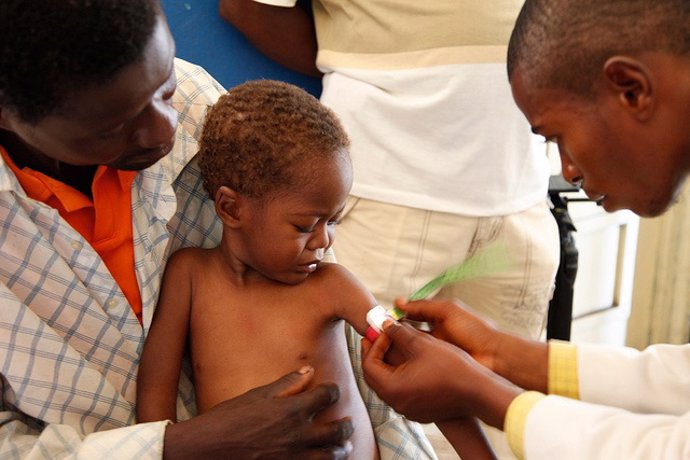
23/08/2018 Desnutrición infantil. Al menos 5 millones de niños han muerto a lo largo de los últimos 20 años en África a causa de enfermedades prevenibles provocadas la falta de acceso a un sistema sanitario y a agua potable como consecuencia de los conflictos armados que atraviesan distintos países del continente. POLITICA ESPAÑA EUROPA MADRID SALUD THE FLICKR/DEPARTMENT FOR INTERNATIONAL DEVELOPMEN
DiYES International School – 9 Million Children Vaccinated across the Horn of Africa through the REACH consortium. This initiative delivers immunization in humanitarian and conflict-affected regions. The program ensures vaccines reach children who have never received immunization before. The REACH consortium, led by the International Rescue Committee (IRC), collaborates with ThinkPlace, Flowminder, and CORE Group. Gavi, the Vaccine Alliance, funds this program. Many local civil society organizations also contribute to the effort.
Around 21 million children worldwide lack proper immunization. Among them, 14.5 million children have never received any vaccines. Reaching these children helps prevent disease outbreaks. The effort strengthens both regional and global health security. Gavi launched the Zero-Dose Immunization Programme (ZIP) in 2022. The initiative directly partners with humanitarian organizations to overcome barriers. The IRC brings extensive experience in humanitarian operations. Their expertise ensures children receive all required vaccines.
“Read about: Chemotherapy in Children: Understanding Potential Side Effects”
In 2022, only 16% of the 156 target communities had humanitarian access. By following humanitarian principles, REACH has expanded access to 96%. Mobile clinics and outreach units serve remote areas. Geospatial mapping enhances planning and service delivery. Many government health systems cannot function in conflict zones. REACH coordinates with national immunization programs. When conditions improve, services transition back to government ownership.
Vaccine delivery costs vary between US$ 1 and US$ 11 per dose. REACH has delivered vaccines at an average cost of US$ 4 per dose. This cost-effective approach enables wider coverage. Gavi and the IRC focus on efficiency. They ensure each dollar contributes to sustainable immunization programs. Investing in these initiatives helps save millions of lives.
“Read more: Early Motor Stimulation: The Key to Child Development”
Dr. Sania Nishtar, CEO of Gavi, highlights the impact of vaccines. She emphasizes their role in protecting communities. She calls for continued innovation and collaboration. Strengthening immunization efforts helps prevent global disease outbreaks. David Miliband, President of the IRC, praises the program. He recognizes the impact of reaching 9 million children. He stresses that humanitarian expertise is key to success. And he urges continued support for sustainable immunization models.
Dr. Mekdes Daba, Ethiopia’s Minister of Health, reaffirms the country’s commitment. She emphasizes the importance of immunization in conflict-affected areas. The Ministry collaborates with partners like Gavi and the IRC. Their joint efforts ensure vaccines reach zero-dose children. Partnerships strengthen national immunization programs. They help build resilient healthcare systems. Every child deserves access to life-saving vaccines.
Beyond delivering vaccine doses, REACH focuses on full immunization. Many older children missed routine vaccinations. The program ensures they complete their immunization schedules. Over 985,000 children have received their first diphtheria, tetanus, and pertussis (DTP1) vaccine. Of those, 376,000 received DTP1 after their first birthday. Progress is evident as more children receive their essential vaccines.
The success of REACH demonstrates the power of partnerships. Combining humanitarian expertise and innovation improves immunization access. As a result, 9 million children have been vaccinated, protecting them from preventable diseases. Governments, organizations, and communities must continue working together. Sustainable immunization efforts safeguard public health. Investing in vaccination programs strengthens global health security. Reaching every child remains the ultimate goal. Immunization saves lives and protects future generations.